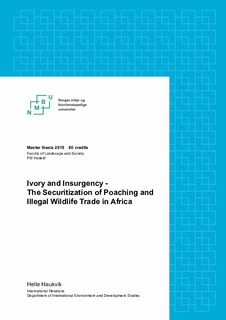| dc.contributor.advisor | Vedeld, Pål | |
| dc.contributor.author | Haukvik, Helle Kobbe | |
| dc.coverage.spatial | Africa | nb_NO |
| dc.date.accessioned | 2018-10-26T09:21:31Z | |
| dc.date.available | 2018-10-26T09:21:31Z | |
| dc.date.issued | 2018 | |
| dc.identifier.uri | http://hdl.handle.net/11250/2569744 | |
| dc.description.abstract | The issue of poaching and illegal wildlife trade (IWT) in Africa has transformed from being a biodiversity concern to being considered a matter of security. Since 2010, it has been declared a threat to national and even global security by a wide range of actors including the United Nations, the EU and the White House. This thesis use securitization theory and discourse analysis to investigate how and why this development has taken place.
By analysing the discourses within and between major global actors, the analysis shows that the current global discourse of security is characterized by a "double threat presentation", where biodiversity and international security are both presented as existentially threatened through poaching and illegal wildlife trade. This development is explained by five main enabling factors. First, evidence suggests that the threat against species survival has escalated along with the Western fears of (Islamic) armed groups. In addition, the threat presentation fitted well to the U.S.' strategic goals and identity as a security state in the post- 9/11-context. The role of Africa and African leaders in global politics is also likely to have facilitated a securitization. Furthermore, powerful environmental NGOs played an essential role as initial securitizing actors and they still continue to exert significant influence on anti-poaching policy and practices. The growing number of private actors within security and technology have also had vested interests in establishing and manitaining a successful securitization discourse. Potential consequences of the securitization are also discussed. These include effects on anti-poaching practices and the risk that African states lose more power to outside actors. Lastly, the positive and negative aspects of bringing the security logic into conservation are highlighted.
The analysis indicates that a securitization has occurred. However, this thesis argues that a security perspective is unlikely to be effective neither regarding species survival or the prevention of wildlife resource trades as threat finance. In particular, it should be ensured that security arguments are not used to justify extreme measures and that sensational security claims are not allowed to detract attention from the underlying causes of poaching and IWT. The results of this thesis also indicate that securitization theory can be a useful perspective for analysing environmental threats. | nb_NO |
| dc.language.iso | eng | nb_NO |
| dc.publisher | Norwegian University of Life Sciences, Ås | nb_NO |
| dc.rights | Attribution-NonCommercial-NoDerivatives 4.0 Internasjonal | * |
| dc.rights.uri | http://creativecommons.org/licenses/by-nc-nd/4.0/deed.no | * |
| dc.subject | Discourse analysis | nb_NO |
| dc.subject | Wildlife conservation | nb_NO |
| dc.title | Ivory and insurgency : the securitization of poaching and illegal wildlife trade in Africa | nb_NO |
| dc.type | Master thesis | nb_NO |
| dc.subject.nsi | VDP::Social science: 200:: 240::International politics: 243 | nb_NO |
| dc.source.pagenumber | 122 | nb_NO |
| dc.description.localcode | M-IR | nb_NO |

